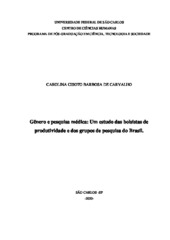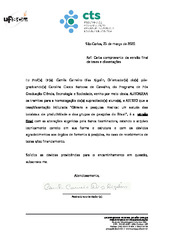| dc.contributor.author | Carvalho, Carolina Cisoto Barbosa de | |
| dc.date.accessioned | 2020-03-30T12:41:46Z | |
| dc.date.available | 2020-03-30T12:41:46Z | |
| dc.date.issued | 2020-02-14 | |
| dc.identifier.citation | CARVALHO, Carolina Cisoto Barbosa de. Gênero e pesquisa médica: um estudo das bolsistas de produtividade e dos grupos de pesquisa do Brasil.. 2020. Tese (Doutorado em Ciência, Tecnologia e Sociedade) – Universidade Federal de São Carlos, São Carlos, 2020. Disponível em: https://repositorio.ufscar.br/handle/ufscar/12375. | * |
| dc.identifier.uri | https://repositorio.ufscar.br/handle/ufscar/12375 | |
| dc.description.abstract | Medical career has always been based on a masculine form of acting and thinking. But, the end of the last century and beginning of the present, show that women are widening their access to medical careers. The evaluation of female presence in the medical area and the repercussion of this presence in the career hierarchy and the allocation of these professionals in the medical specialties have a great impact on the medical training and health care of general population. Like in the medical careers, the sciences have also been of androcentric domination, and women are gradually getting easier access to higher education and academic careers. But it is well known that although the scientific environment shows itself as an area of equal opportunities, women have suffered to occupy higher positions in the hierarchy, to grow professionally and often to achieve the respect of their peers. Therefore, to know the gender relations that permeate the academic environment in the medical sciences research in Brazil, can give an overview of the way in which the participation of female medical researchers occurs. That way and it is possible to evaluate if the increase in the absolute number of medical graduates is reflected on the breakdown of barriers on vertical ascension and on the reduction of horizontal segregation in the practice of medical research. The objective of this research is to map female participation in Brazilian medical research, with the consequent identification of the proportion of women present in the research groups and their position in the scientific rewards system (hierarchy). The work is a descriptive and exploratory case study and uses as primary data sources information extracted from Conselho Nacional de Desenvolvimento Científico - CNPq, related to research groups registered in the Directory of Research Groups of CNPq for the current year of 2017, as well as information about the researchers working in the medical field, also extracted from the CNPq portal on the internet. Secondary data will be collected in field research through a questionnaire to the medical productivity fellowship recipients in Brazil. The results point to a massive female participation in medical research, as well as that leadership is the main funnel in female scientific careers, and there is also a perpetuation of male and female specialties in medical research, leading then to the conclusion that Medicine still needs to undergo changes in its structure so that women can have their spaces guaranteed. As theoretical basis for this research, the literature used is the one that refers to the discussion of gender issues in the Social Studies of Science and Technology (ESCT). | eng |
| dc.description.sponsorship | Não recebi financiamento | por |
| dc.language.iso | por | por |
| dc.publisher | Universidade Federal de São Carlos | por |
| dc.rights | CC0 1.0 Universal | * |
| dc.rights.uri | http://creativecommons.org/publicdomain/zero/1.0/ | * |
| dc.subject | Gênero | por |
| dc.subject | Ciência médica | por |
| dc.subject | Segregação vertical | por |
| dc.subject | Segregação horizontal | por |
| dc.subject | Feminilização | por |
| dc.subject | Gender | eng |
| dc.subject | Medical science | eng |
| dc.subject | Vertical segregation | eng |
| dc.subject | Horizontal segregation | eng |
| dc.subject | Feminilization | eng |
| dc.title | Gênero e pesquisa médica: um estudo das bolsistas de produtividade e dos grupos de pesquisa do Brasil. | por |
| dc.title.alternative | Gender and medical research: a study of productivity fellows and research groups in Brazil. | eng |
| dc.type | Tese | por |
| dc.contributor.advisor1 | Rigolin, Camila Carneiro Dias | |
| dc.contributor.advisor1Lattes | http://lattes.cnpq.br/2388584081961836 | por |
| dc.description.resumo | A Medicina sempre foi uma carreira pautada numa forma masculina de atuação e pensamento, mas entre o século passado e início do presente a mulher ampliou seu acesso às cadeiras na graduação e prática médica. A avaliação da presença feminina na área médica, sua repercussão na hierarquia da carreira e na alocação destas profissionais nas especialidades possui grande impacto na formação das próximas gerações de médicos e no atendimento à saúde da população. Assim como a Medicina, a ciência que outrora fora um ambiente de domínio androcêntrico, paulatinamente deu maior possibilidade de acesso à educação superior e às carreiras acadêmicas por parte das mulheres. Mas apesar de um espaço de aparentes oportunidades iguais a mulher tem sofrido para ocupar cargos de maior destaque e conseguir o respeito de seus pares. O objetivo da investigação da presente pesquisa é mapear a participação feminina na pesquisa médica brasileira, com a decorrente identificação da proporção de mulheres presentes nos grupos de pesquisa e entre os bolsistas de produtividade em pesquisa do CNPq da área médica e sua posição na hierarquia da bolsa. Foi realizado um estudo de caso descritivo e exploratório quali - quantitativo que utiliza como fontes de dados primários informações extraídas do portal do CNPq e de suas bases de dados, o Diretório dos Grupos de Pesquisa do Conselho Nacional de Desenvolvimento Científico e Tecnológico, referentes ao ano base de 2017, de onde foram extraídas informações sobre 880 grupos certificados da área médica e a Plataforma Lattes que forneceu informações sobre os 537 bolsistas de produtividade em pesquisa da área médica do país no ano de 2017. Os dados secundários foram coletados em pesquisa de campo através de um roteiro de perguntas tipo survey que foi enviado às bolsistas mulheres de produtividade da área médica do país. Os resultados apontam a maciça participação feminina na pesquisa médica, mas também que a liderança é o principal gargalo nas carreiras científicas femininas, havendo também uma perpetuação de especialidades masculinas e femininas nesta área de pesquisa, levando então a conclusão que a Medicina ainda precisa passar por alterações em sua estrutura para que as mulheres possam ter seus espaços garantidos.
A pesquisa se ancora na literatura dos Estudos Sociais da Ciência e Tecnologia (ESCT) relativa à discussão de gênero na ciência. | por |
| dc.publisher.initials | UFSCar | por |
| dc.publisher.program | Programa de Pós-Graduação em Ciência, Tecnologia e Sociedade - PPGCTS | por |
| dc.subject.cnpq | OUTROS::ESTUDOS SOCIAIS | por |
| dc.publisher.address | Câmpus São Carlos | por |
| dc.contributor.authorlattes | http://lattes.cnpq.br/2804542810761341 | por |


